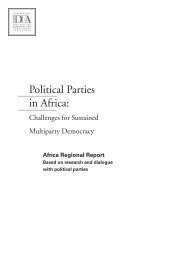Background Document - Danish Institute for Parties and Democracy
Background Document - Danish Institute for Parties and Democracy
Background Document - Danish Institute for Parties and Democracy
You also want an ePaper? Increase the reach of your titles
YUMPU automatically turns print PDFs into web optimized ePapers that Google loves.
While contesting the post of an elected representative (as urban councillors <strong>and</strong><br />
mayors in towns <strong>and</strong> cities or as representatives in countries <strong>and</strong> villages) is the most<br />
visible <strong>for</strong>m of participation in local politics this is not the only means of involvement.<br />
There is a considerable amount of literature that indicates the importance of<br />
women’s in<strong>for</strong>mal community work that also amounts to their involvement in local<br />
politics.<br />
Drawing on experiences from Africa, Chabal (1999) has indicated the porous borders<br />
between the personal <strong>and</strong> the political <strong>and</strong> the importance of unravelling this<br />
in order to underst<strong>and</strong> the political process. If this is so then in<strong>for</strong>mal dynamics at<br />
the community level possibly work in conjunction with <strong>for</strong>mal democratic processes<br />
to enable women to access leadership positions. The by now well-known feminist<br />
articulation that the personal is in fact the political logically led to such a distinction<br />
between <strong>for</strong>mal <strong>and</strong> in<strong>for</strong>mal spaces of politics <strong>and</strong> the importance of the latter <strong>for</strong><br />
women’s political agency.<br />
For instance drawing on case studies from South Asia <strong>and</strong> West Africa, Purkayastha<br />
<strong>and</strong> Subramanium (2004) point to a large number of in<strong>for</strong>mal networks that <strong>for</strong>eground<br />
women’s agency – <strong>and</strong> this would clearly also include political agency – in the<br />
developing world. They point to how local networks from the state of Karnataka in<br />
India have <strong>for</strong>med in<strong>for</strong>mal groups at the periphery <strong>and</strong> become recipients of development<br />
assistance preventing such resources from being captured completely by<br />
local elites. The participation of women in new social movements across the world,<br />
most of them centred on local issues related to life <strong>and</strong> livelihoods, has also become<br />
an important instrument of political trans<strong>for</strong>mation.<br />
However taking a slightly different line of argument, some scholars have rejected<br />
what they see as the artificial dichotomy between the <strong>for</strong>mal <strong>and</strong> in<strong>for</strong>mal spaces<br />
<strong>and</strong> modes of local politics pointing instead to the commonality of the underlying<br />
political processes of both. For instance Brownhill <strong>and</strong> Hal<strong>for</strong>d (2004) draw on examples<br />
of women’s community action in London’s dockl<strong>and</strong>s <strong>and</strong> local government’s<br />
women’s committees to indicate there are theoretical <strong>and</strong> empirical interconnections<br />
rather than disconnects between these two <strong>for</strong>ms of action rendering this dichotomy<br />
between <strong>for</strong>mal <strong>and</strong> in<strong>for</strong>mal politics meaningless in any substantive way.<br />
Having identified the spaces <strong>for</strong> local politics we now turn our attention to the<br />
reasons that are advanced <strong>for</strong> women’s inclusion in local politics.<br />
WHY WOMEN IN LOCAL POLITICS<br />
There is a substantive body of literature on why it is necessary <strong>and</strong> desirable to have<br />
women involved in local politics. The economic conditions of men <strong>and</strong> women differ<br />
<strong>and</strong> women must have the opportunity to allocate scarce resources to also benefit<br />
women <strong>and</strong> bring their perspective to the decision making table. The democratic<br />
component of the system will be strengthened by inclusion of women, <strong>and</strong> the legitimacy<br />
of decisions taken will increase as women gain equal access to a system largely<br />
dominated by men.<br />
It is also possible to argue as Siddiq <strong>and</strong> Allen (2011) have done that women councillors<br />
can make a difference <strong>for</strong> the women they represent, <strong>and</strong> could introduce a<br />
feminized view to local governance more broadly, something that has the potential<br />
to aid all constituents. That is not to say that women should have to help women in<br />
order to ‘earn’ their place on the council, but that the presence of higher numbers<br />
of women in local politics will make this feminization process more likely to occur.”<br />
Acknowledging this, the role of women in decision making at the local level was<br />
specifically addressed by l<strong>and</strong>mark international agreements <strong>and</strong> conventions notably<br />
CEDAW <strong>and</strong> Beijing Plat<strong>for</strong>m <strong>for</strong> Action (1995). The International Union of Local<br />
Authorities Worldwide Declaration on Women in Local Government 1998; Item 9<br />
says:<br />
WOMEN IN POLITICS DANISH INSTITUTE FOR PARTIES AND DEMOCRACY PAGE 25
















